Bachelor of Science in Mechanical Engineering
Mechanical engineers put energy and machines to work–from rockets, robots, and airplanes to automobiles, satellites, and renewable energy systems. In RIT's mechanical engineering BS degree you'll study math, science, physics, engineering science, and engineering systems.
Program Overview
An Engineering degree from RIT Dubai opens up a world of exciting career opportunities and Mechanical Engineering in particular, is involved with a range of cutting-edge design across automotive and aerospace systems, bioengineering devices, and energy-related technologies.
Our labs are equipped to provide you with extensive experimentation and feature everything from 3D printers to Universal Testing Machines, to a comprehensive machine shop to ensure you have access to state-of-the-art facilities to help you in your development as an engineer.
Mission Statement
The Mechanical Engineering Program aims at providing experiential-based undergraduate education that enables graduates to contribute immediately to the industry, services and government organizations and can succeed in pursuing graduate school. The graduates shall be able to accept the professional and ethical responsibilities to function as Mechanical engineers in a globally connected society, and have the means to refine and augment their skills to meet the current and future demands of an ever-changing world.
Program Educational Objectives
The Mechanical Engineering Program Educational Objectives (PEO) are broad statements that describe what graduates are expected to attain within a few years of graduation. Program educational objectives are based on the needs of the program’s constituencies. The Mechanical Engineering faculty, in conjunction with its constituents, have established the following program educational objectives:
PEO 1: “Systems-Based Solutions” Produce graduates who will draw upon the fundamental knowledge, skills, and tools of Mechanical engineering to develop scale-appropriate system-based engineering solutions that satisfy constraints imposed by a global society.
PEO 2: “Life-Long Learners” Produce graduates that will enhance their skills through formal education and training, independent inquiry, and professional development.
PEO 3: “Professional Responsibility” Produce graduates who will work independently as well as collaboratively with others, and demonstrate leadership, accountability, initiative, and ethical and social responsibility.
PEO 4: “Graduate Education” Produce graduates who will successfully pursue graduate degrees at the Master’s and/or PhD level
Program Learning Outcomes
- “Engineering Foundations and “Problem Solving” - An ability to identify, formulate, and solve complex engineering problems by applying principles of engineering, science, and mathematics
- “Engineering Design”- An ability to apply engineering design to produce solutions that meet specified needs with consideration of public health, safety, and welfare, as well as global, cultural, social, environmental, and economic factors.
- “Communication Skills” - An ability to communicate effectively with a range of audiences
- “Professional Awareness and Responsibility”- an ability to recognize ethical and professional responsibilities in engineering situations and make informed judgments, which must consider the impact of engineering solutions in global, economic, environmental, and societal contexts
- “Teamwork and Leadership” - an ability to function effectively on a team whose members together provide leadership, create a collaborative and inclusive environment, establish goals, plan tasks, and meet objectives
- “Experimentation” - an ability to develop and conduct appropriate experimentation, analyse and interpret data, and use engineering judgment to draw conclusions
- “Life-Long Learning”- an ability to acquire and apply new knowledge as needed, using appropriate learning strategies
Click here for Enrolment data for the Bachelor of Science in Mechanical Engineering Program.
The Bachelor of Science in Mechanical Engineering program at RIT Dubai prepares students for a wide range of exciting and challenging career paths. With a comprehensive curriculum and a cooperative internship program, graduates will be well-equipped to succeed in a variety of cutting-edge roles in the mechanical engineering field such as professional energy auditors, air conditioning systems designers, contracting field engineers, manufacturing processes leaders, auto designers and maintenance engineers and many others.
Our graduates work in top international corporations, as well as local companies in the UAE and the wider region. Whether you're interested in designing automotive and aerospace systems, developing renewable and sustainable energy systems devices, contributing to the advancement of novel materials, or pursuing further study (e.g. Master's or PhD), and to explore career paths in academia and research, the Bachelor of Science in Mechanical Engineering program provides the foundation you need to succeed.
The major provides students with a broad academic base complemented by hands-on laboratory activities and professional cooperative education experience. You will devote the first two years to the study of mathematics, physics, chemistry, liberal arts, and engineering sciences, while the third and fourth years emphasize engineering science, design, and systems.
You can then choose to specialize in Energy and Environment, by choosing the appropriate technical electives courses, or complete the program without an option and take a range of technical electives. In the fifth year, you are required to complete the capstone design courses, Senior Design I and II (MECE-497, 498).
You will complete liberal arts general education courses in the social sciences and the humanities to round out your education.
Typical Course Sequence
|
Year One |
||
|
Course Code |
Course Title |
Credit Hours |
|
UWRT - 150 |
General Education – First-Year Writing: UWRT-150 FYW: Writing Seminar (WI) | 3 |
|
MATH - 181, 182 |
Project-based Calculus I, II |
8 |
| General Education -Artistic Perspective General Education-Ethical Perspective General Education-Global Perspective |
9 | |
|
MECE - 102 |
Engineering Mechanics Lab |
3 |
|
MECE - 104 |
Engineering Design Tools |
3 |
|
MECE - 117 |
Introduction to Programming for Engineers |
3 |
|
ASCS - 10 |
RIT 365: RIT Connections |
0 |
|
Islamic Culture Course |
3 | |
|
Year Two |
||
|
MECE - 103 |
Statics |
3 |
|
Physical Science Elective I |
3 | |
|
General Education - Social Perspective |
3 | |
|
MATH - 219 |
Multivariable Calculus |
3 |
|
MECE - 205 |
Dynamics |
3 |
|
MECE - 110 |
Thermodynamics I |
3 |
|
MECE - 210 |
Fluid Mechanics I |
3 |
|
MATH - 231 |
Differential Equations |
3 |
|
MECE - 203, 204 |
Strength of Materials I and Laboratory |
4 |
|
MECE - 305, 306 |
Materials Science with Applications and Laboratory |
4 |
|
EGEN - 099 |
Engineering Co-op Preparation |
0 |
|
MECE - 211 |
Engineering Measurements Lab |
2 |
|
Year Three |
||
|
MECE - 348 |
Contemporary Issues |
3 |
|
MATH - 326 |
Boundary Value Problems |
3 |
|
Physical Science Elective II |
3 | |
|
EEEE - 281 |
Circuits I |
3 |
|
General Education - Immersion II |
3 | |
|
PHYS - 212 |
University Physics II |
4 |
|
MECE - 499 |
Co-operative Education |
0 |
|
|
ME Approved Science Elective |
3 |
|
Year Four |
||
|
MECE - 320 |
System Dynamics |
3 |
|
MATH - 241 |
Linear Algebra |
3 |
|
MECE - 310 |
Heat Transfer I |
3 |
|
MECE - 301 |
Engineering Applications Lab |
2 |
|
MECE - 348 |
Contemporary Issues in Mechanical Engineering (WI) |
3 |
|
MECE - 499 |
Co-operative Education |
Co-op |
|
Year Five |
||
|
MECE - 497 |
Multidisciplinary Senior Design I |
3 |
|
MECE - 498 |
Multidisciplinary Senior Design II |
3 |
|
|
ME Applied Electives |
6 |
|
|
ME Applied or Extended Core Elective |
3 |
|
STAT - 205 |
Applied Statistics |
3 |
|
|
General Education - Immersion II, III |
6 |
|
|
Open Elective |
6 |
|
Total Credits -129 |
||
Please see New General Education Curriculum–Liberal Arts and Sciences (LAS) for more information.
(WI) Refers to a writing-intensive course within the major.
A sample of Mechanical Engineering Electives (indicative only):
-
MECE 350 Strength of Materials II
-
MECE 352 Thermodynamics II
-
MECE 489 Special Topics: Refrigeration & Air Conditioning for Hot and Humid Climates
-
MECE 529 Renewable Energy Systems
-
MECE 544 Introduction to Composite Materials
OPTIONS
As a Mechanical Engineering student at RIT Dubai, you have the flexibility to customize your education to suit your career goals. You can choose from one of three options: Energy and Environment, Aerospace Engineering, or Automotive Engineering, or opt to complete the major with the General Mechanical Engineering option and select technical electives that align with your interests. Additionally, you have the opportunity to complement your education by selecting a minor in a related field, further enhancing your skill set and marketability (refer to the list of offered minors on our website).
For those interested in exploring even more options, RIT Dubai also offers the opportunity to study abroad or transfer to the RIT campus in New York, where you can specialize in bio-engineering, subject to achieving additional requirements. With the ability to tailor your education to your goals and interests, RIT Dubai provides a dynamic and personalized experience for its mechanical engineering students.
Resources
For information about the RIT New York, Mechanical Engineering program and options click here
-
Click here to view/download the flowchart of the BS Mechanical Engineering program (2020- )
-
Click here to view/download the flowchart of the BS Mechanical Engineering program (2018 - )
-
Click here to view/download the flowchart of the BS Mechanical Engineering program (2012 - 2017)
-
Click here to view/download the program-specific handbook
-
Click here for Major Electives and Option Requirements
To graduate, students need to complete all the requirements as listed in the curriculum. Click here for the graduation policy.
Click here to download undergraduate catalogue for complete descriptions of each course within the program.
Industry 4.0 and Robotics Lab
The Robotics and Industry 4.0 LAB is designed to support and present research in the future of Industry. The main objective is to provide a platform to test and develop universal solutions to optimize the industrial processes given the technological and other industrial advances. This infrastructure is already available to the academic and research community both private and public. The Intelligent Supply Chain LAB (Located alongside the Industry 4.0 Lab) provides a test and experimentation platform to students and researchers from both industrial and academic communities to experiment and develop solutions to the integrated supply chain because of the ever-changing environment. It includes modular elements to simulate similar industrial contexts.
Solid Mechanics Lab
The Solid Mechanics Lab at RIT – Dubai is a well-equipped laboratory for mechanical testing of materials with various experimental facilities. The main objective of the laboratory is to provide students with hands-on experience in structural testing and material property characterization. The lab supports various undergraduate and graduate courses in the mechanical engineering program.
Research Center
This laboratory provides a large working space and equipped with data acquisition equipment to be used by the senior students in their final year graduation projects, also by the graduate students and faculty for their research. The research laboratory is placed next to the mechanical workshop to facilitate the design and manufacturing activities. The research center serves a wide range of graduate and undergraduate courses, not limited to MECE 301: Engineering Application Lab, Multidisciplinary Senior Design I & II, MECE-300: Intermediate Machining and Fabrication Lab, MECE 104: Engineering Design Tools.
Thermo Fluids Lab
The Thermo-fluids Lab at RIT – Dubai houses different apparatuses and experimental setups related to various disciplines of thermodynamics and fluid mechanics. The lab provides students with hands-on experiences in thermo-fluids and the ability to test and study thermal and aero/hydrodynamics devices and machines. The lab includes experiments that serve in a wide range of graduate and undergraduate courses, such as MECE 110 Thermodynamics, MECE 210 Fluid Mechanics, MECE 211 Engineering Measurements Lab, MECE 310 Heat Transfer, MECE 402 Turbomachinery, MECE 409 Aerodynamics, MECE 689 Air Conditioning in Hot Humid Environments.
Materials Science Lab
The Materials Science Laboratory is primarily used by the Mechanical Engineering students to support relevant courses and research activities. The Material Science laboratory consists of equipment such as destructive tensile testing, hardness testing, creep testing, impact testing, metallographic specimen preparation and microscopic examination etc. The experiments are designed to support theoretical concepts taken by the students in the lecture sessions. The students will learn the procedure of measurement, software used in data acquisition, and familiarity with the practical apparatus.
Mechanical Workshop
The Mechanical Workshop at RIT Dubai is a well-equipped laboratory with a variety of conventional and non-conventional machine tools such as machining, grinding, casting, welding, laser cutting, and 3D printing. This laboratory offers a strong hands-on training component of the study to all undergraduate and graduate students. The laboratory also offers an interdisciplinary innovative space for both instructional and research activities. The lab also serves as a workshop for Mechanical and Industrial Engineering.
Engineering Mechanics and Instrumentation Lab
The Engineering Mechanics Laboratory is primarily dedicated to support the freshmen Mechanical Engineering courses. The laboratory supports experiments related to Newtonian mechanics from a calculus-based fundamental perspective with close coupling to integrated laboratory experiences. Topics include kinematics; Newton's laws of motion; work, energy, and power; systems of particles and linear momentum; circular motion and rotation; and oscillations and gravitation within the context of mechanical engineering, using mechanical engineering conventions and nomenclature. Each topic is reviewed in lecture, and then thoroughly studied in multiple accompanying laboratory sessions. Students conduct experiments using modern data acquisition technology; and analyze, interpret, and present the results using modern computer software.
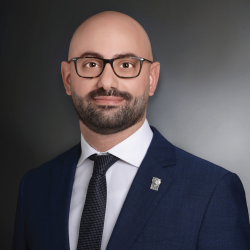
Dr. Wael Abdel Samad
Associate Professor and Chair
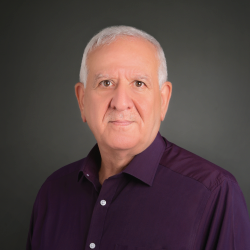
Dr. Ghalib Kahwaji
Professor
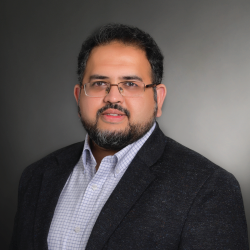
Dr. Salman Pervaiz
Associate Professor
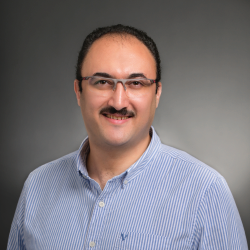
Dr. Mohamad Samaha
Associate Professor

Dr. Dua Weraikat
Assistant Professor

Dr. Mohammed Abdulrahman
Assistant Professor
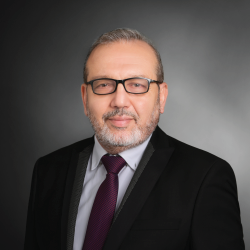
Mr. Mohannad Ali
Lab Manager
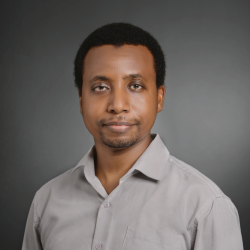
Mr. Ali Daneji
Lab Instructor
Mr.Mohamed Mahmoud
Manager - Technology Improvements,
Technology Development & Transfer
Emirates Global Aluminium

